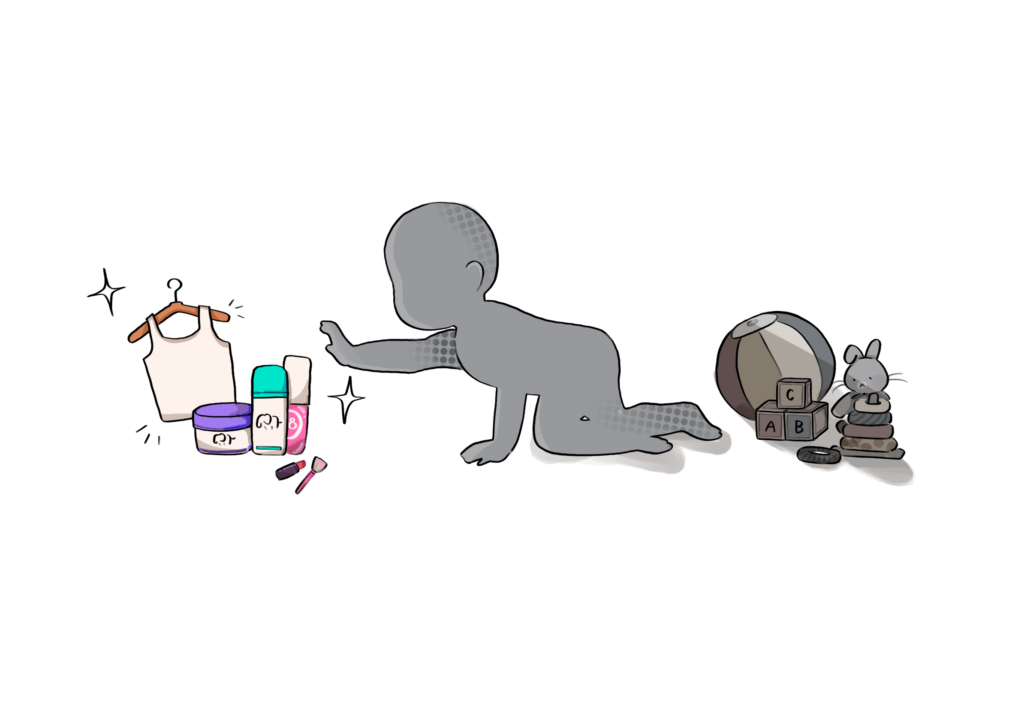
Lillian Huang
During early 2024, social media users were inundated with thousands of parody videos about the current largest epidemic: Sephora kids. From pre-teens to as young as six years old, young girls around the country have seemingly been restoring the economy through their purchases of Lululemon leggings, drunk elephant skincare and Sol de Janeiro perfume sets.
As the parody videos of Sephora kids persist, there are many fingers pointed at a variety of sources for this plague: social media influencers, parents failing to set appropriate boundaries and even other kids all contribute to an entire generation acting far older than they are.
“The majority of influencers on social media [are] in their 20s, and the narrative [online] is only around them,” said junior Evie Stern. “There’s not really good representation for pre-teens and younger children, so they just liken themselves to the adults they see online.”
Parental figures also play a role in this development.
“[Parents] just want their kids to like them because they’ve been placed in this situation where they replaced parenting with friendship, so they want to keep their kids happy,” said senior Kasey Guerra Dorsa. “[Think back to] when you were really little and you really liked your parents and then when you become a teenager, you start to become embarrassed of them. When their kids are transitioning, one way [for parents] to get [their kids] to like them more is to support their leap in maturity.”
This desire for many girls to act older could also stem from expectations they face at younger ages.
“There’s more pressure [on girls] to be beautiful and mature,” Stern said. “Adults are always saying that girls are more mature for their age, while for boys it’s much more excusable to be chaotic. I see that with my own little brother. He’s eight years old, and all the girls in his class are kind of expected to be the role models of the class while the boys just go feral and the teachers are like, ‘Oh, he’s eight.’”
However, others find that boys also face similar expectations.
“[Boys] might experience [the pressure] to act tough [and to] not talk about their feelings because they need to man up,” said freshman Angelie Cruz Pantoja.
With more influencers recently creating content aimed at a younger male audience, these strong views of masculinity may be transferred to a younger age group than before.
“Andrew Tate is pushing a certain aesthetic and a very specific agenda of what he thinks that masculinity should be,” said senior Janak Bhuta. “These influencers are in their 30s or 40s, so they have a lot more life experience, and they’ve defined what they want [masculinity] to be themselves. But people who are younger that might not know better might just adopt that [mindset and] start practicing that at a young age.”
With many factors that play a role in the desire to be older, many students find it alarming.
“When [kids] start out young and they’re trying to act more mature than their age, … [they] lose out on [their] childhood,” said senior Malia Choi. “Childhood [is a time where] you can be free to do whatever you want, and then when you’re older … you have more responsibilities. [Kids are now] missing out on that fun time when you could just have fun with your friends.”
However, some find it hypocritical to judge kids’ responses to the causes.
“We all have annoying little things we did as kids at some point,” Stern said. “You just have to let them figure out their way through the funky years and grow into a mature person. There’s no way to really avoid it. I don’t think we should critique kids for that because they’re learning and growing … I don’t even love kids that much myself, but it feels wrong to hate on them for wanting to buy Drunk Elephant. They’re teen girls [and] 10-year-old girls.”
With many children having the desire to grow older, the causes of this development, including social media, pressure and expectations go unnoticed and continue to impact children’s self-esteem and actions.



